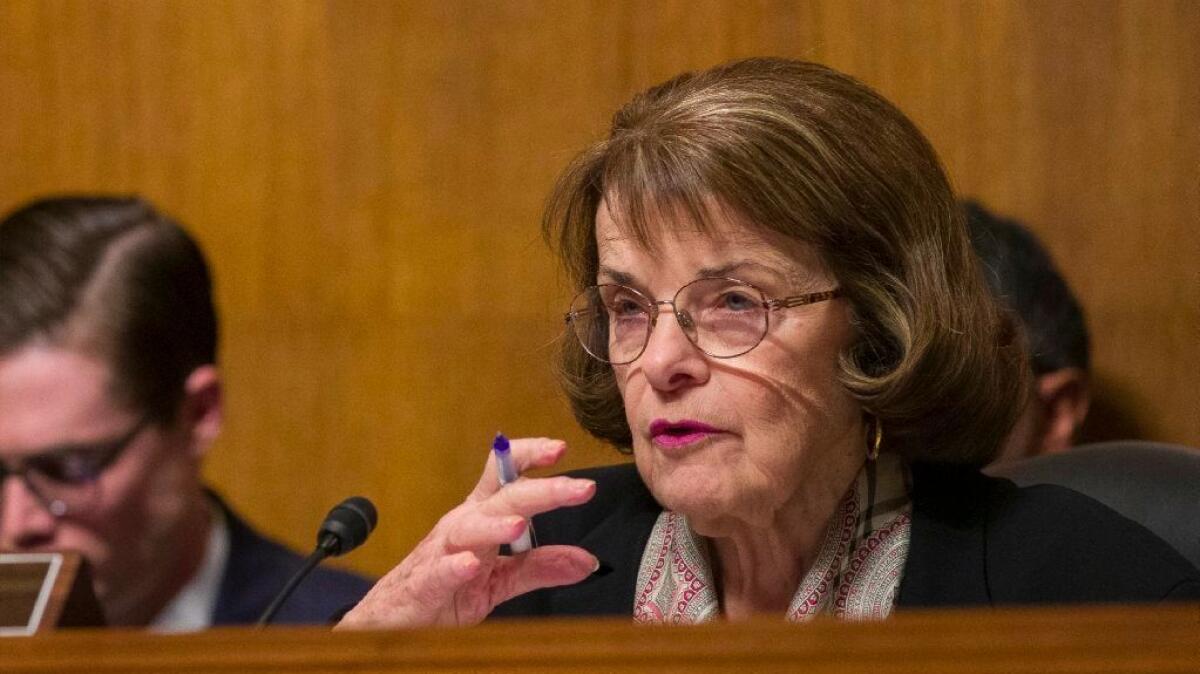Trump’s 9th Circuit nominee says he’s sorry for past writings about women and AIDS

- Share via
Reporting from Washington — President Trump’s pick for a California seat on the 9th Circuit apologized Wednesday for failing to disclose to the Senate dozens of articles he wrote in college, saying he regretted his youthful positions on sexual harassment, gays and AIDS.
California Sens. Dianne Feinstein and Kamala Harris had accused Los Angeles litigator Kenneth Kiyul Lee, 43, of hiding about 75 articles from the Senate Judiciary Committee, which heard testimony from Lee and another Trump nominee, Los Angeles appellate attorney Daniel P. Collins, 56.
Many of Lee’s undisclosed writings touched on controversial topics, including affirmative action, politics on college campuses, abortion, gay rights and ebonics. Most were uncovered by journalists and the senators’ staff.
In a Feb. 10, 1994, Cornell Review article, Lee decried Clinton-era ads promoting condom use to prevent the spread of HIV and asserted that “a scientific explanation exists for the higher incidence of AIDS in the gay community. Homosexuals are more promiscuous than heterosexuals, and thus their risk factor increases exponentially.”
Lee said Wednesday he regretted writing the article, which he said was an attempt to defend President Reagan’s legacy fighting AIDS.
“I absolutely would not write that today. I truly regret writing that. Frankly, as an 18-year-old, I didn’t know anything,” Lee said. “Looking at that now 28 years later, frankly I’m embarrassed by it.”
In a Feb. 8, 1996, Cornell Review article headlined “Feminist Follies,” Lee wrote, “According to these radical feminists, an innocuous hug is tantamount to sexual assault — a loaded term that sounds like rape. These wild accusations are consistent with gender feminist rhetoric: they exaggerate the charges to make them sound more alarming to win support for their political agenda.”
Lee said the college writings reflected a lack of understanding and maturity. “I’d like to think I’ve matured as a person over the last two and a half decades,” he said.
Several of Lee’s writings that were not initially disclosed were from the same date and publication as articles he did produce. But Lee said Wednesday the omissions were inadvertent, noting that many were written before the spread of the internet.
“I made every good faith effort to collect everything that I had. I even went to my mom’s old house, went through the garage,” Lee said. “I apologize for this. I understand it’s caused inconvenience and is frustrating. It is frustrating for me as well.”
Sen. Chris Coons (D-Del.) responded that Lee only initially provided 11 articles to the Judiciary Committee and that Senate staff easily found the missing articles in their routine background search.
Lee has repeatedly supplemented his Senate Judiciary Committee questionnaire in the last month as more articles have become public that he did not initially disclose, either when he first submitted the lengthy committee questionnaire that all nominees complete or when interviewed by a judicial review committee set up by Feinstein and Harris.
Most were written while Lee was a student at Cornell University, but some were written in the last 10 years while he was a practicing attorney.
The hearing was the first chance California’s senators had had to publicly grill Trump’s 9th Circuit picks to fill vacancies in the state. They were nominated over the objections of both Feinstein and Harris.
For nearly two years, the senators have appeared to have slowed Trump’s ability to fill three California vacancies on the 9th Circuit, even as Trump raced to put conservatives judges in other circuits around the country.
The president has filled a record 36 circuit court vacancies in just over two years, including flipping the 3rd Circuit from majority Democratic appointees to majority Republican appointees.
The liberal 9th Circuit has been the source of most of Trump’s court losses to date, and conservatives have been anxious to begin filling the vacancies.
Late last year, the administration seemed to have given up on trying to find nominees acceptable to the California senators and plunged ahead without their approval.
Lee, an immigrant from South Korea, attended Cornell as an undergraduate and earned a law degree at Harvard. He worked on Capitol Hill and as associate counsel in the George W. Bush White House before entering private practice.
The committee didn’t vote on either nominee Wednesday and wasn’t expected to act before the end of the month.
Pivotal GOP swing vote Sen. Tim Scott of South Carolina told the State newspaper Wednesday that Lee had shown that he had evolved since college. Scott said he was leaning toward supporting Lee’s confirmation despite the writings, a move that leaves Feinstein and Harris with little chance of getting enough votes to block Lee.
Feinstein said the California senators also had questions about Collins’ “temperament and rigidity” and said their judicial review commissions found he had “a history of taking strong litigation positions for no reason other than attempting to overturn precedent and push legal boundaries.”
Trump has also nominated Daniel A. Bress, 39, a Washington, D.C.-area partner with Kirkland & Ellis, to the 9th Circuit in California. Bress, born in California, has not lived in the state since high school. The state’s senators have questioned whether he has sufficient ties to California. His confirmation hearing has not been scheduled.
The American Bar Assn. rates both Collins and Lee as well-qualified to serve on the 9th Circuit. It has not yet rated Bress.
More stories from Sarah D. Wire »
More to Read
Get the L.A. Times Politics newsletter
Deeply reported insights into legislation, politics and policy from Sacramento, Washington and beyond. In your inbox three times per week.
You may occasionally receive promotional content from the Los Angeles Times.











